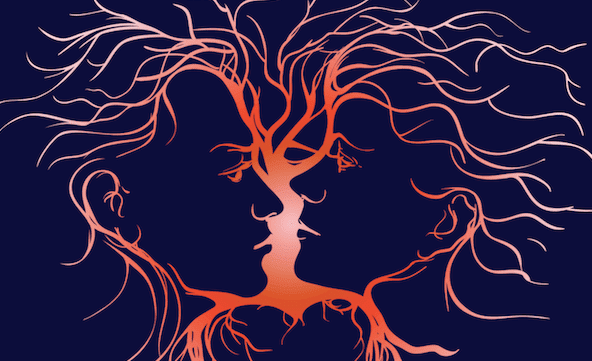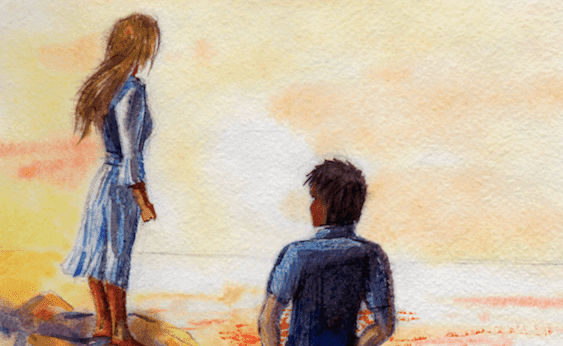Emotional Intelligence to Heal the Wounds of Our Relationships


Written and verified by the psychologist Valeria Sabater
We know that relationships, like bones, also break. However, those fractures don’t always heal as fast as we think. Time alone doesn’t heal us. Everything hurts and it’s hard to find a remedy. Hence, emotional intelligence can help us close those internal scars little by little.
Franklin D. Roosevelt said that, when we reach the end of a rope, there’s only one option: tie a knot and wait. Ending up with something that until not long ago kept us tied down and secure always produces anguish.
We feel as if our whole being is plunging into a void. However, far from leaving us to our fate and neglecting us, we must make a knot of security and wait. That feeling of fear and helplessness will go away eventually.
“Don’t rush, it calms you. Work on yourself before falling into despair after a tear. Feel, leave, give yourself time, and love yourself enough to continue breathing, so as not to need someone who’s no longer there and doesn’t want to be with you.”
-Russ Von Hoelscher-
Life is an unpredictable experience. We know this. It’s a journey where it’s impossible to avoid peaks and plateaus. Sometimes the journey is painful, so much so that we come to think that we can’t withstand any more setbacks, twists, and turns. Whether we want to or not, we’re forced to use a basic survival kit so that we can overcome these unforeseen events with forcefulness.
Emotional intelligence provides valuable resources that help us handle adverse life events in a better way. Let’s delve deeper into this.

Emotional intelligence to heal the wounds of our relationships
Using emotional intelligence to heal wounds from our failed relationships, broken or fractured by unexpected losses or other traumatic events, will give us two very specific types of tools. The first is to be able to manage pain in a healthy and creative way. The second is to recover (and improve) our healing ability to continue enjoying positive relationships and interactions.
The emotional pain generated by many of the aforementioned events leads us to become trapped in very negative behavior and thought patterns. We also run the risk of suffering from some psychological disorder such as depression or anxiety.
In addition, our interpersonal development is also affected. We stop trusting others and we enter cycles of marked frustration where we find it very difficult to recreate strong and healthy bonds with other people.
Therefore, many people who come to therapy do so precisely because of the problems in their emotional relationships. Many patients face the almost constant shadow of abandonment. Others suffer from unrequited love and many are still stuck in harmful and toxic relationships without knowing what to do.
This is why we should take a look at these strategies that can help us better cope with these situations.
Connecting in a healthy way to our emotions
Emotional intelligence to heal wounds tells us that we must learn to connect with our inner universe in a healthier way. We usually focus exclusively on our pain when faced with a loss or a complex affective situation. We tend to focus on the suffering and disappointment that end up clouding, hurting, and blocking us.
- With this approach, we only enlarge the hole of bitterness.
- We know that these negative emotions are there and that they have a very specific origin. Therefore, once we identify and accept them, it’s time to channel them and transform them to use them in our favor rather than against us. We need to regulate them and not let them stop us. We must give them dynamism so that we can react to them.
- If we feel anger, we need to channel it into something positive. When we experience sadness, we need to relieve it until its weight slowly decreases day by day. If what we’re experiencing is fear from a harmful relationship, we should ask for help and support to face that source of anguish so that we can feel safe.
We have to remember that the disordered and chaotic accumulation of emotions leads us to show dysfunctional patterns of behavior. Therefore, we need to apply emotional intelligence to heal and bring order, identify, channel, and use emotions in our favor.

Empathy with oneself and personal security
Emotional intelligence to heal wounds often places a special emphasis on a very special part of empathy. We refer to that ability to connect with ourselves and to see our own wounds in a more compassionate and meticulous way.
- After a breakup or any other painful or traumatic event, you have to regain personal safety. Thus, the firm, open, and conscious determination to repair each wounded corner and each fragmented piece through forgiveness and self-affection is the key to moving forward day by day.
- If we focus exclusively on our own suffering, we’ll limit ourselves to walking in circles. In the end, the pain will finish us off little by little. It’ll force us to take full control and fill every space, fiber, and recess of our reality. And that’s something we should avoid. Empathize with yourself and establish an action plan.
Emotional healing as a fuel for personal growth
People do well when they focus on feelings and sensations as they appear. It must be a fluid process, something that awakens that innate healing intelligence that resides in the body and mind. It’s a process that’s similar to digestion where we can make each experience serve as fuel for personal growth.
If we allow rage, disappointment, or despair to remain stagnant, we’ll get sick. We’ll end up suffering due to abandonment, an unrequited love, or the anguish of being in an unhappy relationship. These emotions must be processed in a healthy way to become empowered and have the possibility of growing maturely and responsibly.

To conclude, we can see that emotional intelligence to heal wounds is a necessary resource to better handle difficult situations. It’s a way to tame our fears to remember our values and that imperious need to overcome, to allow us to get ahead better than we were before.
We have to say that this isn’t a simple process. It isn’t something that we can achieve in two days or a month. Effectively applying these strategies often implies a change of consciousness that generates a thorough transformation that will undoubtedly reach every area of our lives. Because when you understand and put your emotions to work in your favor, everything changes.
We know that relationships, like bones, also break. However, those fractures don’t always heal as fast as we think. Time alone doesn’t heal us. Everything hurts and it’s hard to find a remedy. Hence, emotional intelligence can help us close those internal scars little by little.
Franklin D. Roosevelt said that, when we reach the end of a rope, there’s only one option: tie a knot and wait. Ending up with something that until not long ago kept us tied down and secure always produces anguish.
We feel as if our whole being is plunging into a void. However, far from leaving us to our fate and neglecting us, we must make a knot of security and wait. That feeling of fear and helplessness will go away eventually.
“Don’t rush, it calms you. Work on yourself before falling into despair after a tear. Feel, leave, give yourself time, and love yourself enough to continue breathing, so as not to need someone who’s no longer there and doesn’t want to be with you.”
-Russ Von Hoelscher-
Life is an unpredictable experience. We know this. It’s a journey where it’s impossible to avoid peaks and plateaus. Sometimes the journey is painful, so much so that we come to think that we can’t withstand any more setbacks, twists, and turns. Whether we want to or not, we’re forced to use a basic survival kit so that we can overcome these unforeseen events with forcefulness.
Emotional intelligence provides valuable resources that help us handle adverse life events in a better way. Let’s delve deeper into this.

Emotional intelligence to heal the wounds of our relationships
Using emotional intelligence to heal wounds from our failed relationships, broken or fractured by unexpected losses or other traumatic events, will give us two very specific types of tools. The first is to be able to manage pain in a healthy and creative way. The second is to recover (and improve) our healing ability to continue enjoying positive relationships and interactions.
The emotional pain generated by many of the aforementioned events leads us to become trapped in very negative behavior and thought patterns. We also run the risk of suffering from some psychological disorder such as depression or anxiety.
In addition, our interpersonal development is also affected. We stop trusting others and we enter cycles of marked frustration where we find it very difficult to recreate strong and healthy bonds with other people.
Therefore, many people who come to therapy do so precisely because of the problems in their emotional relationships. Many patients face the almost constant shadow of abandonment. Others suffer from unrequited love and many are still stuck in harmful and toxic relationships without knowing what to do.
This is why we should take a look at these strategies that can help us better cope with these situations.
Connecting in a healthy way to our emotions
Emotional intelligence to heal wounds tells us that we must learn to connect with our inner universe in a healthier way. We usually focus exclusively on our pain when faced with a loss or a complex affective situation. We tend to focus on the suffering and disappointment that end up clouding, hurting, and blocking us.
- With this approach, we only enlarge the hole of bitterness.
- We know that these negative emotions are there and that they have a very specific origin. Therefore, once we identify and accept them, it’s time to channel them and transform them to use them in our favor rather than against us. We need to regulate them and not let them stop us. We must give them dynamism so that we can react to them.
- If we feel anger, we need to channel it into something positive. When we experience sadness, we need to relieve it until its weight slowly decreases day by day. If what we’re experiencing is fear from a harmful relationship, we should ask for help and support to face that source of anguish so that we can feel safe.
We have to remember that the disordered and chaotic accumulation of emotions leads us to show dysfunctional patterns of behavior. Therefore, we need to apply emotional intelligence to heal and bring order, identify, channel, and use emotions in our favor.

Empathy with oneself and personal security
Emotional intelligence to heal wounds often places a special emphasis on a very special part of empathy. We refer to that ability to connect with ourselves and to see our own wounds in a more compassionate and meticulous way.
- After a breakup or any other painful or traumatic event, you have to regain personal safety. Thus, the firm, open, and conscious determination to repair each wounded corner and each fragmented piece through forgiveness and self-affection is the key to moving forward day by day.
- If we focus exclusively on our own suffering, we’ll limit ourselves to walking in circles. In the end, the pain will finish us off little by little. It’ll force us to take full control and fill every space, fiber, and recess of our reality. And that’s something we should avoid. Empathize with yourself and establish an action plan.
Emotional healing as a fuel for personal growth
People do well when they focus on feelings and sensations as they appear. It must be a fluid process, something that awakens that innate healing intelligence that resides in the body and mind. It’s a process that’s similar to digestion where we can make each experience serve as fuel for personal growth.
If we allow rage, disappointment, or despair to remain stagnant, we’ll get sick. We’ll end up suffering due to abandonment, an unrequited love, or the anguish of being in an unhappy relationship. These emotions must be processed in a healthy way to become empowered and have the possibility of growing maturely and responsibly.

To conclude, we can see that emotional intelligence to heal wounds is a necessary resource to better handle difficult situations. It’s a way to tame our fears to remember our values and that imperious need to overcome, to allow us to get ahead better than we were before.
We have to say that this isn’t a simple process. It isn’t something that we can achieve in two days or a month. Effectively applying these strategies often implies a change of consciousness that generates a thorough transformation that will undoubtedly reach every area of our lives. Because when you understand and put your emotions to work in your favor, everything changes.
This text is provided for informational purposes only and does not replace consultation with a professional. If in doubt, consult your specialist.







